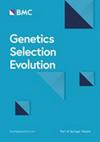Uncertainty in the mating strategy of honeybees causes bias and unreliability in the estimates of genetic parameters
IF 3.6
1区 农林科学
Q1 AGRICULTURE, DAIRY & ANIMAL SCIENCE
引用次数: 0
Abstract
Breeding queens may be mated with drones that are produced by a single drone-producing queen (DPQ), or a group of sister-DPQs, but often only the dam of the DPQ(s) is reported in the pedigree. Furthermore, datasets may include colony phenotypes from DPQs that were open-mated at different locations, and thus to a heterogeneous drone population. Simulation was used to investigate the impact of the mating strategy and its modelling on the estimates of genetic parameters and genetic trends when the DPQs are treated in different ways in the statistical evaluation model. We quantified the bias and standard error of the estimates when breeding queens were mated to one DPQ or a group of DPQs, assuming that this information was known or not. We also investigated four alternative strategies to accommodate the phenotypes of open-mated DPQs in the genetic evaluation: excluding their phenotypes, adding a dummy pseudo-sire in the pedigree, or adding a non-genetic (fixed or random) effect to the statistical evaluation model to account for the origin of the mates. The most precise estimates of genetic parameters and genetic trends were obtained when breeding queens were mated with drones of single DPQs that are correctly assigned in the pedigree. However, when they were mated with drones from one or a group of DPQs, and this information was not known, erroneous assumptions led to considerable bias in these estimates. Furthermore, genetic variances were considerably overestimated when phenotypes of colonies from open-mated DPQs were adjusted for their mates by adding a dummy pseudo-sire in the pedigree for each subpopulation of open-mating drones. On the contrary, correcting for the heterogeneous drone population by adding a non-genetic effect in the evaluation model produced unbiased estimates. Knowing only the dam of the DPQ(s) used in each mating may lead to erroneous assumptions on how DPQs were used and severely bias the estimates of genetic parameters and trends. Thus, we recommend keeping track of DPQs in the pedigree, and not only of the dams of DPQ(s). Records from DPQ colonies with queens open-mated to a heterogeneous drone population can be integrated by adding non-genetic effects to the statistical evaluation model.蜜蜂交配策略的不确定性导致遗传参数估计的偏差和不可靠
育种蜂王可能与单个无人机生产蜂王(DPQ)或一组姊妹-DPQ 生产的无人机交配,但血统中通常只报告 DPQ 的母本。此外,数据集还可能包括在不同地点公开交配的 DPQ 的蜂群表型,从而导致无人机种群的异质性。在统计评估模型中以不同方式处理 DPQs 时,我们使用模拟来研究交配策略及其建模对遗传参数估计和遗传趋势的影响。我们量化了育种皇后与一个DPQ或一组DPQ交配时的偏差和估计值的标准误差,假定这些信息已知或未知。我们还研究了在遗传评估中考虑开放交配的 DPQ 表型的四种替代策略:排除其表型、在血统中添加假假母系或在统计评估模型中添加非遗传(固定或随机)效应以考虑配偶的来源。当育种皇后与在血统中正确分配的单一 DPQ 的无人机交配时,可获得最精确的遗传参数和遗传趋势估计值。然而,当它们与来自一个或一组 DPQ 的无人机交配时,由于不知道这些信息,错误的假设导致这些估计值出现相当大的偏差。此外,通过在每个开放交配无人机亚群的血统中添加一个假假种,对来自开放交配DPQs的蜂群的表型进行调整,也会大大高估其遗传变异。相反,通过在评价模型中加入非遗传效应来校正异质性无人机群体,则能得出无偏的估计值。只知道每次交配中使用的 DPQ 的水坝,可能会导致对 DPQ 使用方式的错误假设,并严重影响对遗传参数和趋势的估计。因此,我们建议跟踪血统中的 DPQ,而不仅仅是 DPQ 的母本。通过在统计评估模型中加入非遗传效应,可以整合来自与异质无人机种群开放交配的蜂王的 DPQ 群体的记录。
本文章由计算机程序翻译,如有差异,请以英文原文为准。
求助全文
约1分钟内获得全文
求助全文
来源期刊

Genetics Selection Evolution
生物-奶制品与动物科学
CiteScore
6.50
自引率
9.80%
发文量
74
审稿时长
1 months
期刊介绍:
Genetics Selection Evolution invites basic, applied and methodological content that will aid the current understanding and the utilization of genetic variability in domestic animal species. Although the focus is on domestic animal species, research on other species is invited if it contributes to the understanding of the use of genetic variability in domestic animals. Genetics Selection Evolution publishes results from all levels of study, from the gene to the quantitative trait, from the individual to the population, the breed or the species. Contributions concerning both the biological approach, from molecular genetics to quantitative genetics, as well as the mathematical approach, from population genetics to statistics, are welcome. Specific areas of interest include but are not limited to: gene and QTL identification, mapping and characterization, analysis of new phenotypes, high-throughput SNP data analysis, functional genomics, cytogenetics, genetic diversity of populations and breeds, genetic evaluation, applied and experimental selection, genomic selection, selection efficiency, and statistical methodology for the genetic analysis of phenotypes with quantitative and mixed inheritance.
 求助内容:
求助内容: 应助结果提醒方式:
应助结果提醒方式:


